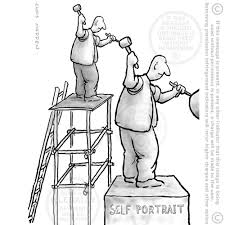To Be[at] Or Not To Be[at]…
 Shoshin
No one in particularNowhere Special Veteran
Shoshin
No one in particularNowhere Special Veteran
WARNING…This post is not aimed at those who are under professional supervision for clinical depression …However perhaps some of the comments that may arise from this thread, may be of some assistance in helping to combat some symptoms…..
It would seem that "beating one’s ‘self’ up" for some, has become somewhat of an art ‘form’…“I should have known better…I shouldn’t have done that…I’m hopeless, I’m always doing the wrong thing!” etc etc….
A habit formed long ago… the habit art of not being good enough (or the habit of perfection ) always needing to do better than the last time, but not quite making it, which often leads to beating your 'self' up …never satisfied with the results “Dukkha” ie, what is,,,
Tis said that Buddhism helps those who help them ‘selves’ to find non-self…
On a personal note, understanding thinking and thinking patterns ( through meditation the science of the mind) have helped me to keep thinking in check…
I no longer become roped in to the "monkey chatter" going on...However....…
"I do like all sentient beings (even monkeys who like to chat)...But they can take their "gossip" elsewhere...for I've had enough of that" 
So what Buddhist techniques have you found helps you to stop this critical part of the mind from disrupting your peace of mind ?




Comments
In therapy I was discussing my "life script" and how it has lead to a self-fulfilling cycle of subjugation and self hatred. It was relieving to talk about. There are a few giant boulders keeping me from finally believing in myself. But I'm just chipping away at them day by day. I never had any experiences standing up for myself when I was young so I honestly do not know how to do it.
I feel a lot better. I know I can do great things and there's a lot out there for me. It's just the first step into that process that is so daunting. I want to do things to further myself, but I just can't get past the initial fear and confusion... I guess I don't know what to do so I do nothing. I don't blame myself anymore, I just know it is a fact. Courage is not the absence of fear; it's overcoming fear.
I am very interested in the Pure Land term "bombo" which in harsh words is "spiritual idiot." We are all bombo, we will never not be bombo, and despite that we can still find shinjin (https://en.wikipedia.org/wiki/Shinjin). In shinjin, bombo and Amida Buddha co-exist as one. The nembutsu (NAMU AMIDA BUTSU) is me, bombo, calling out to Amida Buddha. Amida answers immediately, because that is the power of his Primal Vow. If I keep the nembutsu in mind Amida is always with me. And even when I do not keep him in mind, he is still waiting for me in the Pure Land. All I must do is open my arms to him and listen closely.
I think bombo is the greatest equalizer. We are all bombo, whether rich or poor or genius or stupid. Amida also lets everyone into his pure land, regardless of their karma or condition. Everyone is the same to Amida, no one is better or worse than another...if Amida feels that way, and I do the nembutsu, then I will slowly learn that too.
I am going to take time for myself and try to work on my esteem and self love. I think if I did this (improving my bombo condition) and also heightened my practice (shinjin) I would believe in Amida and myself enough to do anything... It seems wistful now but I will get there
I think I am kind of a perfectionist. I don't really beat myself up anymore or get stuck in negative self talk. I do strive to do everything right and the best, but if I make a mistake or don't reach that goal I am able to let it go and accept that I didn't reach it. Is that still a perfectionist or does being a perfectionist mean you can't let it go until it is perfect?
The best, simplest instruction for overcoming negative self talk I've come across is to learn to talk to yourself like you would a good friend. If you said to your friends "(you) should have known better…(you) shouldn’t have done that…(you're) hopeless, (you're) always doing the wrong thing!” etc etc…." You'd be a monster and without friends.
You may think that being hard on yourself is motivating, but it actually makes you feel bad about yourself and that you're not worth doing good, healthy things for. Being nice to yourself is motivating because if you like yourself you will want to do good, healthy things for yourself.
Just catching my thoughts and trying to remember to not believe everything I think!
@Shoshin said, ""I do like all sentient beings (even monkeys who like to chat)...But they can take their "gossip" elsewhere...for I've had enough of that"
So what Buddhist techniques have you found helps you to stop this critical part of the mind from disrupting your peace of mind ?"
Like the poem:
I do like all sentient beings
(even monkeys who like to chat)
...But they can take their 'gossip' elsewhere
...for I've had enough of that."
cute
I've just become far more aware of what's going on when I think this, that or the other.
I'm able to just stop it in its tracks (often enough where I see a nice big change in me).
There are some types of things where it's an automatic 'stop'.
I noticed very recently that when I'm around even one super-duper monkey-minded person, it's easy to forget what I've studied (Buddhism) and how well I've been doing, and get pulled off-track. I've then decided to just go back and keep on being aware.
@Bunks I like what he calls "A troll in our own mind" part... It reminds me of The mind being charmed by its own thoughts
Outstanding thread so far everyone
Meditation. Every day. Mindfulness every other day. On days off ... oh ... there ain’t none.
Helping or subsidary or calming practices:
Just in the nick of time @lobster


It takes time to chip away at the many years of conditioned self to reveal its empty nature...But it would seem you are gradually getting there...Slow and steady wins the race

My thoughts seem to be slow and with persistence, so I don’t notice the monkey mind very much. It’s just a succession of thoughts, a slow stream that I’m caught up in, not really monkey chatter.
When I pause it seems emptiness is very much there... but underlying it there is still worry energy lurking beneath the surface, ready to try and take over if I feed it attention.
I like the way Thich Nhat Hanh explains it, the conscious mind and the store, where all the seeds are, and by giving attention we call up the energy of different seeds into the conscious mind, which then grow stronger or weaker in the store.
@Kerome
Years of conditioning/programming, reinforcing unwholesome habits such as worry, anxiety, fear ,(the mind at WAR) have for many become the default option, or one could say comfort zone which one's mind slips back into in times of so-called crises...
However....
Mindfulness practice is like exercising the mind's muscles of 'awareness & attention' ....The more one persists in one's practice the easier the peace keeping becomes...That is... to flex these muscles ...
...
.
I think that’s true, I think many people do live out of their Worry, Anxiety, Fear centre. It’s a very immediate way of thinking, and many people have a subconscious scanner running in their brains looking for things that they should be afraid of. It’s a survival tactic, people get addicted to it, but perhaps more useful to a monkey in a tree than a human in a modern society.
When trying to live the spiritual life, out of loving-kindness, generosity, compassion and other impulses, one has to free oneself of that impulse, divest yourself of this habit. Otherwise you cannot function from these other centres.
Having combated both ADHD and PTSD, as a practicing Buddhist, I have applied both Buddhist and nonbuddhist techniques. On the Buddhist practice side, I utilize the chanting meditation of the SGI Nichiren Buddhist school. (Nam-myoho-renge-kyo). I have gained the wisdom, strength and confidence that makes my actions and efforts effective. The "monkey chatter" neither deters nor controls me. My awareness of my environment is heightened while my focus is sharpened without deluding either.